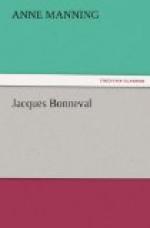Just after the women and children had retired for the night to a little inner dungeon, La Croissette once more presented himself uninvited.
“I thought, messieurs, you might like to hear the news of the day,” said he.
“Most certainly,” said my father. “Pray be seated. I wish I had a better seat to offer you. What is stirring?”
“The news, then, is, that Nismes is being converted as fast as possible,” said La Croissette. “No persuader, sirs, like fire and sword. Dragoons are quartered on every Protestant. They are destroying whatever they cannot make booty of. Some are littering their fine black horses with bales of broadcloth, silk, and cotton; others with fine Holland cloths. The common people are being driven to church at the sword’s point, and conforming by shoals. The gentry give more trouble, but end by coming round.”
“Some may—some weak-hearted persons,” said my father, reluctantly.
“Well, they may be weak-hearted; I’m sure I should be, in their place,” said La Croissette. “In fact, what is it?—a mere form. They just slur over a few words—cross themselves—kiss a relic, or some little matter of that sort. No more is required; the bishop lets them off easy.”
“Will the Lord let them off easy?” said my father. “Christianity admits of no such temporizing. The early Christians might have saved their lives by burning a handful of incense before the Roman Emperor’s statue; but they did not hold it a mere form. And the Romanists admit in principle what they dissent from in practice; for they almost deify those early martyrs for their constancy to the truth, and yet would martyr us for doing the very same thing.”
“Well, I don’t mean them to martyr me,” said La Croissette, “I’ve an elastic creed, I!—it stretches or collapses like an easy stocking.”
“Beware, beware, my friend, of fancying a creed like that of any worth at all.”




